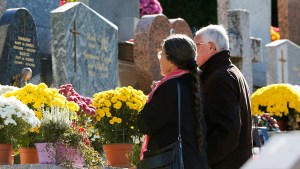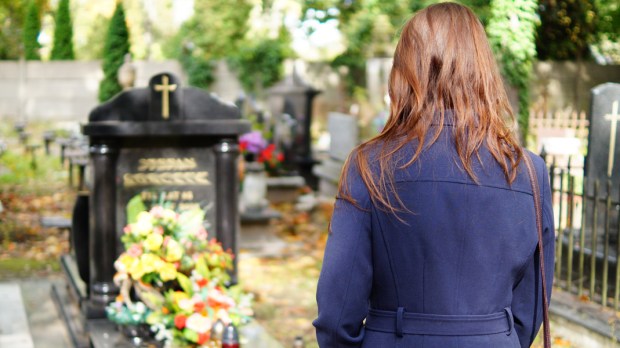Lenten Campaign 2025
This content is free of charge, as are all our articles.
Support us with a donation that is tax-deductible and enable us to continue to reach millions of readers.
It was at this time last year, when the glow of autumn surrenders to an early winter, that I dashed out my back door, frustrated and annoyed. Winter winds howled almost as loudly as the cranky kids I’d left behind with my husband. The constant duty of simply feeding my kids was driving me nuts – their allergies and pickiness and jet speed metabolisms were overwhelming me.
So on this particularly hungry, windy day, I ditched my stuffy kitchen for a brisk walk, and immediately I began to breathe a little deeper. Leaves crunched beneath my feet as I lost track of time. Eventually I meandered into our local cemetery, a place I often go when I need to think; a place I don’t regard as a spooky place, but a welcoming spot where each gravestone tells a story.
The sun started to set as I walked along the rows. Eventually, I turned down an overgrown path — one I’d never noticed before — and almost immediately, I saw my own name – “Sarah Jane. Born 1891 – Died 1952.” I sat down in the brown grass and stared for a while, then traced the familiar letters with my thumb, thinking memento mori(One day, I’ll be lying here.). But also, I took some time to ponder this other ‘Sarah Jane’ and the span of her years.
Two World Wars, I thought, And the Great Depression …
Did you lose your husband in the First War? Your son in the Second?
I touched the plaster lambs nearby, representing the babies this Sarah Jane had lost. My own miracle newborns, August and Henry, flashed into my mind – my infants who were saved by modern medicine; one baby needing a helicopter life flight, and both needing respiratory care that didn’t exist in this Sarah Jane’s day.
Tears stung my eyes. Suddenly the frustrations that sent me outdoors looked different, especially as I imagined how this Depression-era mom would have danced at the sight of my bursting pantry.
The temperature dropped some more, but I stayed by Sarah’s headstone, straightening up her plot, pondering life before washing machines existed. I imagined a woman in a dignified house dress and red lipstick, waving at me through space and time. She was laughing as she worked, pinning starched sheets on the clothesline, a toddler splashing in a sudsy bucket by her feet.
I hopped up to search for flowers, but gathered crimson leaves instead. Laying them on her headstone, I took note of its modesty — “She was working class, like me,” I thought, “Her husband, a coal miner covered in soot.”
“Pray for me,” I asked aloud, feeling more grateful than when I’d arrived, and a little less alone.

Read more:
Indulgences Pope Francis wanted for the deceased in this time of pandemic

